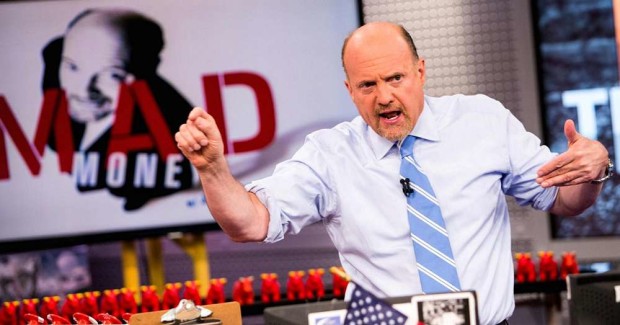Two writers break out of their pigeon-holed careers to give us a prestige flick.
Genre: Drama-thriller
Premise: A Jim Kramer-like TV personality is held up on live television by a man who lost his life savings investing in one of the show’s stock tips.
About: This one stars George Clooney and Julia Roberts and will be directed by the underrated Jodie Foster, who unfortunately got screwed over in her last directing effort, The Beaver (with the whole Mel Gibson meltdown and all). The writing brain-trust behind this one is interesting in that they’re not the typical guys who land high-caliber talent. Jim Kouf hit it big with Rush Hour, but would later hit rock bottom with the Jimmy Fallon/Queen Latifah comedy, Taxi. Alan DiFiore is known mostly for TV movies, although he’s found some recent success with the TV show, Grimm. Sony looks to have been as nervous as I was going into this, so they brought in hot writer Jamie Linden, who wrote one of my favorite scripts, Dogs of Babel, to hammer out a production-ready draft.
Writers: Alan DiFiore & Jim Kouf (most recent draft by Jamie Linden)
Details: 120 pages – July 15th, 2014 draft
Check it out. Yet ANOTHER original property. We’ve reviewing more and more of these these days. I don’t know about you, but that tickles me in places I’m not supposed to talk about.
What’s great about today’s script is that it proves writers can change the industry’s perception of them. A writer’s IMDB page can be like Jacob Marley’s ball and chain, a visual rolodex of all the failures he’s had. If someone doesn’t know you and sees the “Taxi” link on that chain, you’re probably not pitching them American Sniper. The blessing of making it in this business can also be a curse.
However, we’ve learned with today’s script, and the recently reviewed “Elvis and Nixon,” that there’s a secret formula to getting out of “Hack Time Out.” Know what it is? Anybody want to guess?
WRITE A BIG CHARACTER.
For Kevin Spacey, he got to play one of the biggest caricatures of all time – Richard Nixon. Clooney gets to play JIM KRAMER, one of the wildest TV personalities on air. Actors can’t resist big characters because they allow them to have fun AND show their acting chops to boot.
So if you’re stuck in a rut or feel like you’re being pigeonholed, I’ve given you your flashlight to freedom. Write a big fun character that an actor would want to play.
After getting our obligatory George Clooney opening voice over, we meet his character, Lee Gates, the “Money Monster.” Lee Gates has a popular over-the-top stock-tip show where his sole job is to hyperbolize about MONEY. There is no such thing as a “good” or a “bad” stock. It must be “A stock I would make love to every second of every day for the rest of my life if I could,” or “the single most toxic stock in America.” Lee looooovvvves the entertainment side of his job.
The money advice side? Ehh. Not so much.
And that’s what gets him in trouble.
During the daily taping of his show, while Lee prattles on about some stock tip in India, a guy named Kyle sneaks onto the live set and puts a gun to Lee’s head. He explains that last week, Lee trumpeted a stock called “Eden Capital.” Told everyone to throw their entire life savings into it. And that’s exactly what Kyle did.
Problem is, Eden Capital tanked yesterday. Lost 400 million dollars. The company’s excuse? It was a “glitch” in their trading algorithm. But see, simple-minded Kyle doesn’t understand that explanation. He wants something that these billion dollar companies never seem to give out: THE TRUTH.
As it so happens, Lee was scheduled to interview the CEO of Eden this morning to get an explanation about what happened. But the company’s globe-trotting CEO can’t be found. Speaking for him in his stead is the buttoned up Diane Lester, the head of PR for Eden. But that isn’t enough for Kyle. He wants answers. And he’s only going to accept them from the company’s founder. So what happens if the founder doesn’t show up? Lee’s going to get a stock-tipped bullet to the skull.
It took me awhile to figure out what kind of movie this was. In the end, I settled on a cross between Network, Dog Day Afternoon, Man on a Ledge, and Tower Heist. Yes, I can hear what you’re thinking. You hope it’s a lot more like the first two than the last two. And it is. Just maybe not as much as you’d like it to be.
But there are some nice things to celebrate here, starting with how cozily the concept fits into the spec-script mold. It’s a contained setup: man gets held up live on the air. That keeps the majority of the script focused on one event, in one location, with a contained time frame. Those are elements that screenplays love.
What do I mean by that? When you build a storyline that has clear boundaries, both geographically and time-wise, it’s like coloring. You’ve given yourself the lines already, now all you have to do is color them in.
When you don’t set up clear boundaries, you’re coloring on a giant canvas with no lines at all. Now this can be a good thing. You might come up with the next Being John Malkovich. But more often than not, your script turns into a sprawling mess.
How do you color an object that isn’t there? How do you know which objects to introduce in the first place? A perfect example of this was Jupiter Ascending. That movie had some beautiful colors. But we never saw what they added up to because they were all the hell over the place.
So how does Money Monster separate itself from the aforementioned movies? Well, unlike Dog Day Afternoon, which focused on two sides – the cops and the robbers – Money Monster adds a third element – a mystery. This B-story, which is Diane’s story, takes us outside the studio to hunt down why this supposed “algorithm glitch” occurred.
This infused the script with an added layer of suspense. This is a tool available to all of you in every screenplay you write. You can always add a mystery. Money Monster could’ve easily kept everything in-studio and focused on Lee and Kyle. And maybe we would’ve gotten a good script out of that. I don’t know. But there was something intriguing about this mysterious “glitch,” to the point where it became the main reason I was turning the pages.
My only problem with the script was that I thought they could’ve done more in the studio. I thought Lee Gates was going to be a lot crazier. Maybe I’d been pre-conditioned by the “Attica!” and “I’m mad as hell and I’m not going to take this anymore!” bombs dropped by Lee’s predecessors, and that expectation got in the way. Still, the Gates character seemed to be playing on an acoustic guitar when he should’ve been thrashing an electric.
And Kyle, the man who takes Lee hostage, was really boring. He didn’t have anything going on. And maybe that’s why Lee didn’t shine as brightly as he could’ve. He didn’t have anything to work against. Whatever the case, because these two were the focus of the script, and they didn’t bring the house down with their battle, the script never reached the heights it aspired to.
Despite this criticism, there’s plenty to celebrate here. I like Linden a lot and have a feeling he probably addressed some of these issues in further rewrites. Obviously, a lot will depend on Clooney’s performance. Does he elevate what’s on the page? If so, who knows? This could be a sleeper hit.
[ ] what the hell did I just read?
[ ] wasn’t for me
[x] worth the read
[ ] impressive
[ ] genius
What I learned: If one of your characters is coming off as too plain or too reserved, it may not be the character himself that’s the problem. It may be the character playing opposite him for the majority of the movie. If that character is reserved or boring or uninteresting, he may not be giving your main character enough to work with. One of the reasons the dialogue between Jules and Vincent in Pulp Fiction is so good is because BOTH characters are interesting and vibrant and pushing each other. Neither is some boring lug. Kyle here was a boring lug. And that indirectly hurt the character of Lee.




